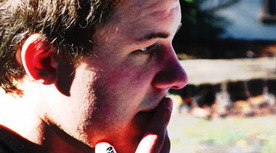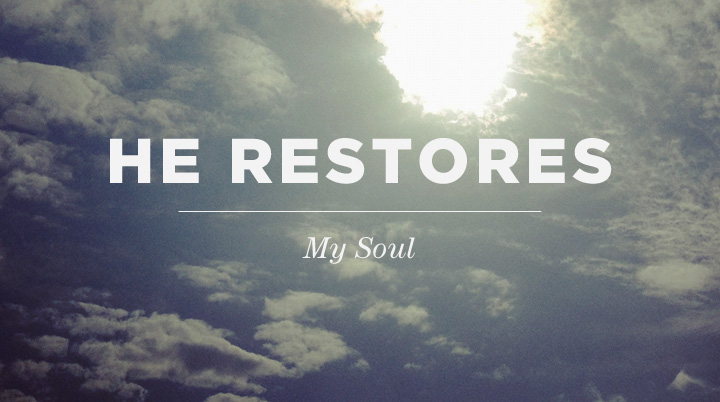|
This week's post comes from Ashley Tripp, a University of Alabama alumni, who posted for Cru.org. As you read, ask yourself, "Do I need to hear this?" or "Is there an incoming freshman I could encourage this with?"
A growing trend reveals that college freshmen aren’t just preparing a goodbye speech to their families, but to their faith as well. Conor Friedersdorf writes in The Atlantic, “[Freshmen] leave their church, the community incentives to attend it, and the watchful eye of parents who get angry or make them feel guilty when they don’t go to services or stray in their faith. Suddenly they’re surrounded by dorm mates of different faiths or no faith at all.” However, because I attended a university in the heart of the Bible Belt, it came as no surprise to see many college students dressed in their Sunday best for church. But what did come as a shock to me was how these church attenders behaved the remaining six days of the week. Attending church doesn’t make one a Christian, and yet, this is a lie many college students believe. Even as someone who grew up in a Christian family, I struggled too with living out my faith instead of saving it for Sundays. Certain barriers pushed me away from experiencing the fullness of my relationship with Jesus. The majority of my first semester revolved around sorority life, school, dance and Alabama football. I didn’t get plugged in a campus ministry because I would make up excuses. I was becoming a part of the growing trend of saying goodbye to my faith. Who knew I would need a spiritual survival kit in addition to my freshman survival kit? It wasn’t until the spring of my sophomore year that I settled down and became invested with Bama Cru, Cru’s campus ministry at Alabama. At Bama Cru, staff member Jeff Norris is “convinced that the greatest need that incoming college freshmen have is to explore and develop the spiritual area of their life.” “One of the best ways to do this is in the context of community,” Jeff said. “Often times, freshmen are curious about faith and want to develop their spiritual life, but they don’t know where to start or who to start with.” How not to lose your faith in college Pursuing a relationship with Jesus and living out one’s faith seemed to be a thing of the past as I looked around at the brokenness on campus. Most students don’t come into college thinking they’ll lose their faith. But then to-do lists pile up, and it becomes a backburner. However, I found that my faith actually strengthened during college once I became more intentional about my activities. These are a couple of things I found helpful: 1. Get Plugged Into a Ministry Whatever your theological background, get plugged in with a group of solid believers who love God and love people. I chose to become involved with Bama Cru, Campus Crusade for Christ’s chapter at Alabama. Surrounding myself with a community of believers, I created relationships and gained a deeper understanding of the Christian faith. It wasn’t until college when I realized Christianity was not just a certain religion, but also a relationship with Jesus. 2. Take On a Leadership Role Are you passionate about your faith? Seek after a leadership role on campus. I became my sorority’s chaplain and spread the love of Jesus Christ among my Gamma Phi Beta sisters. Some of my friends from Bama Cru led a six-week video series from Matt Chandler on dating, relationships and sex based off of the book of Song of Songs in the Bible. Open to anyone, the series was held at different sorority houses each week. In addition, my sorority collaborated with another sorority for a Bible study on Marian Jordan’s book, “Radiance.” 3. Attend a Summer Project The summer before my senior year in college, I went on Greek Summit, a summer project led by Cru staff in Destin, Fla. There, I met over 100 college students from across the nation. The purpose of the mission trip was to learn how live out one’s faith and how to become an influence in your sorority or fraternity. It was probably the best two weeks of my college career. I learned a great deal about the Gospel and what it looks like to share one’s faith with your sorority sisters. 4. Make it a Priority Reading the Bible and attending church is what “Culture Christianity” tells society is the right way to practice Christianity. I’ve discovered it’s a daily walk and a personal relationship. When I wake up, I do my best to make it a priority to spend time with God, not in a routine manner or because it’s my duty as a Christian, but because God is my reason for living. It’s almost like brushing your teeth. Do you brush your teeth because it’s a part of your routine, or do you do it so that your teeth won’t rot away? With enough passion and perseverance, it is possible to live out your faith into your college experience.
1 Comment
The following was written by staff member Robyn Stauffer Skur for cru.org.
Joel Connealy didn’t realize his first job interview could be so life-threatening. He showed up at the Jewish Community Center ready to learn how to officiate baseball games. But no sooner had the 15-year-old stepped onto the ball field when shots rang out. Gunfire took the life of another high school freshman and his grandfather, as well as a third bystander later. And like an umpire struck by a wild pitch, Joel now views life warily. With a steady stream of bombings, shootings and natural disasters in our national experience, the murders in suburban Kansas City don’t seem that unusual. These tragedies can cause us to feel unsafe, unsure about the world. And it’s more than a feeling. The worldis unsafe. Unfortunately, we buy into a sanitized view of life – particularly in the U.S. As folk singer Melvina Reynolds wrote in 1963, we tend to live in “little boxes on the hillside, little boxes made of ticky tacky…that all look just the same.” It’s more than a feeling. The world is unsafe. We think that we’re insulated from trouble in our little boxes. But we’re not. We often don’t take to heart 1 Peter 4:12: “Beloved, do not be surprised at the fiery trial when it comes upon you to test you, as though something strange were happening to you." I know I felt that way – surprised. My husband and I had just made the bold move to southwestern France in 2001 to help pioneer a Cru ministry when the 9/11 attacks hit. In a neighborhood full of North African immigrants, we had already felt self-conscious, donning our tennis shoes and pushing a double jog stroller that screamed Americans! To add to the uneasiness, 10 days after the events in New York City, a local fertilizer plant exploded leaving a 10- by 50-meter crater and 29 dead, with hundreds injured. One was a 15-year-old boy. Foul play was suspected, never confirmed. I was standing in our living room when the ka-boom came, and two seconds later the glass from 4 French doors exploded inward. My toddler seated on an Ikea rug pushing wooden trains evaded injury only by God’s grace. My three-year-old son, 2 days into life at a French preschool, escaped flying glass as his class played outdoors at the time. Innocence lost. Our remaining 9 months in Toulouse, I felt a constant low-burner fear. I jumped at sudden noises. I imagined men with guns shooting me through my kitchen window or taking aim at our small courtyard from their high rise subsidized apartments. Not very rational fears, but lodged in my subconscious just the same. Back in the heartland, Joel and his dad had returned from a missions trip to Guatemala just 3 weeks before the shootings. And yet, they only had to travel 4 miles to the JCC to have innocence stripped away. How can we all be more prepared for tragedy while not being immobilized by it? Sometimes it just involves a shift in our mental position. Tragedy helps us to:
Cru staff member Alan Lyle takes his fears to the Lord in prayer. Right after his 8-year-old daughter gets on the bus every day, he huddles with other parents to pray for her safety. He asks the Lord to “send angels to guard the school doors from evil men.” And if God chooses not to? “The God that calls the stars out by name, that gives us air to breathe and sings over me personally each night,” says Alan in his Tennessee drawl, “is in control of all events in this broken world. And it will not be restored until our Lord’s return.” Breast cancer survivor and Cru staff member Vivian Mabuni has wrestled with God. “My plans are to die old,” says the California mom of 3. “But God has asked me: ‘Even if you were to go before that, can you trustMe with your kids?’ I want to live out a life that’s Plan A. But only a small percentage of us get to live out our Plan A in all areas. I’m trying to trust that God’s ways really are better.” And God’s better ways sometimes include suffering. As goes the oft-quoted interaction about Aslan in Lewis’ The Lion, the Witch and the Wardrobe. “Then he isn’t safe?” asked Lucy. “Safe?” said Mr Beaver; “don’t you hear what Mrs. Beaver tells you? Who said anything about safe? ‘Course he isn’t safe. But he’s good. He’s the King, I tell you.” We follow a good King out into chaos. Back in France, the rambunctiousness of our boys wouldn’t allow us to huddle indoors the days after the explosion. We had to venture out. God had shielded us from harm, and He continued walking beside our wide stroller on those narrow sidewalks littered with broken glass. Shootings, explosions and natural disasters will keep happening. The Bible says so. But God meets us in our fears and promises to usher believers on to a tear-free eternity. Consider Joel’s take-away from the JCC shootings: “Everywhere is dangerous, and so we need to tell others about Jesus.” His dad wrote me the day after: “What a world! Jesus is our only hope.” We, with the apostle John, can say, “Come, Lord Jesus.” But until He does, we need to keep clinging to and proclaiming a God that is good in a world that is just not safe. Below is a true story of how God changed one freshman's life. As you read, ask yourself, "where do I find myself in this story?" This fall, might you, like AJ, have an opportunity to help a freshman like Sam discover what really matters? Or, are you more like Sam? Could God be calling you to find true, lasting satisfaction in Him? Take a moment to put yourself in the shoes of this upcoming freshman class, and pray that God would open their hearts to Him and His great love!  When Sam attended his first week of college, he was not looking for a Christian group, in fact it was not on his radar at all. Raised in a Christian family, he routinely went to Sunday School and youth group. However, when he started high school, he questioned the reality of God. By year 12 he was less interested in church, starting on a destructive path fueled by the approval of friends and lust of the world. After an unexpected break-up with a girlfriend, Sam was shaken. He says: “I was dating a girl from youth group. She went to some camp, came back and didn’t talk to me for a week. She said ‘God’s telling me that it’s not His plan for us to be together.’ I was like, ‘He didn’t tell me that!’ I took it really bad.” Sam found solace in drinking. During his gap year after high school, he began clubbing, eventually pushing boundaries by experimenting with drugs like ecstasy. “I wasn’t happy. I knew something was wrong,” says Sam. When the first week of classes rolled around, it had been two years since Sam attended church. That week, Cru ran a booth where they handed out spirituality surveys. Sam filled one out. A few days later, he received a call from a missionary AJ. Although hesitant to meet AJ, Sam did. Through their first meeting, God began to turn Sam’s life around. AJ was there to listen, but strongly prompted Sam to make a decision about what he already knew to do. Sam checked out his first Cru group meeting and was refreshed by people different from his friends. They were not trying to impress each other and talked about things that really mattered. Sam started attending church again. Sam began to recognize his sensual life of lust and drugs was eating him alive, and he could not break free. He says: “During the worship session I was on my knees and was crying; I was a mess. I knew something wasn’t right--something had to change. I remember surrendering my life to God.” From that moment the pleasures that consumed him lost power, and he began seeing victory over the sins that had plagued him. The satisfaction Sam finds in pleasing God far outweighs his old habits, and he now lives with a passion to do what God is calling him to do. He lives in the ecstasy of new life in Jesus. Having open, honest and accountable friends from Cru has been a huge encouragement. Furthermore, being discipled by AJ has made a lasting impact on Sam’s life. He says: “Every time I share my story, it just reminds me I have a lot to be thankful for. It’s God that has brought me this far. I can never go back.” Sam is now happily married to a wonderful young lady named Eldora. This story was written by Gina Liu on June 25 2012. You can find more stories like it at www.cru.org. “They who wait for the Lord shall renew their strength.” Isaiah 40:31
Trusting God is not comfortable. It doesn’t belong in a Hallmark card picture — a colorful valley, a quaint village, a church steeple, with a sentimental slogan. Trusting God can be extremely uncomfortable, even painful. Rabbi David Kimchi, one of the early Hebrew lexicographers, defined the verb “wait” in Isaiah 40:31 with reference to the medieval German verb for “twist.” That is, waiting on the Lord can involve tension and pressure and stress. How could it be otherwise? Waiting is pent-up irresolution. It is not a light thing to wait trustingly for the Lord: “Behold, as the eyes of servants look to the hand of their master, . . . so our eyes look to the Lord our God, till he has mercy upon us.” Psalm 123:2 “My soul waits for the Lord more than watchmen for the morning, more than watchmen for the morning.” Psalm 130:6 “I stretch out my hands to you; my soul thirsts for you like a parched land.” Psalm 143:6 My point is this. You may be going through hell right now. You may be bewildered, gasping, frightened. But that doesn’t mean you aren’t trusting God. It might mean you are trusting God. Isaiah really understood something. He understood that it’s in this tension that our strength is renewed. How so? There is something about coming to the end of ourselves and our own strength and wisdom — that’s when our hearts finally crack open, and the love of God pours in. When we have nothing of our own left, when nothing will suffice but that which is directly and immediately of God, that’s when God alone is our sufficiency, and we find him to be so. -Ray Orlund is Lead Pastor of Immanuel Church in Nashville, Tennessee and a Council member with The Gospel Coalition. You can read more of his thoughts at http://thegospelcoalition.org/blogs/rayortlund/ If only we had more money.
If only I had a date... If only I could get my house really clean. If only I had alone time. If only I could sleep more. Feeling inadequate and out of control of any number of life stresses, I feel small and weak. Instead of being humbled, I tend to reject the discomfort of my need, and become prideful. I demand control, believing that if I regain control, I will be restored. My wandering, grumbling heart searches for some end to my familiar fatigue. IF ONLY I’D HOPE IN GOD Here’s what my “if only’s” tell God: what he has given me in some moment is not good and I’ll hope when the conditions are met, not in him. Exhaustion is an occasion to demand, grumble or to find hope in God, again. Recently, frazzled and mumbling “if only’s,” I opened Psalm 23 with a chaotic heart, throwing a silent fit with God: "OK, fine! I will read my Bible. I know that is what you want." The Psalm surprised and confronted me with words that exposed the sin of my misplaced hope. God whispered through his word: "Daughter, I am your only restoration." I foolishly believe I could escape exhaustion by submitting my “if only” list for God to fulfill totally missing that he is my greatest restoration. If God would just give me sleep or alone time, then I would be OK. But God, relentless in his faithfulness, reveals all the measly hopes of my soul being restored, because nothing actually satisfies a craving heart more than Jesus. When I’m tired, weak, and tempted, he gently leads me to himself. “He leads me beside still waters. He restores my soul.” Psalm 23:2 It is he who restores my soul. All of the alone time and money in the world can’t compare to God’s presence. Clean homes and date nights are blessings, but meaningless without God’s presence enjoyed. Sure, sleep boosts my weary body, but my soul is only restored by Jesus. GOD IS THE MEANS AND THE END It’s not magic, though. I don’t just limp toward God’s word, open and magically return to my joyful and rested self. Sometimes, it is a tooth and nail fight to resist grumbling and doubt in my heart. To let God restore us is to want him more than the effects of being restored. Get that? It’s like wanting coffee merely for an energy boost, rather than its taste and aroma, too. God is not the way to get rest. He is both the way and the destination for our soul rest. A QUIET, PEACEFUL JOY As we submit our hearts to Jesus, weariness becomes a quiet joy. Our gloom turns to peace. God’s word gives us hope, as our weakness is laid at his feet, telling us that his power is made perfect in our weakness. The precious gift of weakness shows us how powerful Jesus really is. It’s amazing. Wearily, we can come to the Father and he always meets us, comforts us, speaks to us, and holds us close. The only soul restoration is in God alone, and there’s no “if” to it: he always satisfies. By Trisha Wilkerson for The Resurgence. For more resources like this, go to www.theresurgence.com Good Wednesday morning friends. We continue to hope that you are having a fun, restful, and Christ-drenched summer, that He would be even more satisfying than long days at the pool, or ice-filled cups of sweet tea and lemonade. One of the greatest mistakes we can make in the Christian life, is to think that Jesus's main purpose in our lives is to make us "healthy, wealthy, and wise." No-rather, He came to rescue a people for Himself, so that He might become the all-satisfying treasure and pursuit of our lives. Pastor John Piper puts it this way: Being satisfied in God (or anything) always seems easier when all is going well. But when things you love are being stripped out of your hands, then the test is real. If God remains precious in those moments, then his supreme worth shines more brightly. He is most glorified. This week, rather than a message to read, we've shared a story with you from a ministry named Desiring God. It's a love story between a husband and his wife, but it might be different than what you expect. As you watch, consider Jesus and ask, "Right now-am I treasuring Christ as greater than all things in my life?" Hear Pastor Piper again as he introduces this story: "The most meaningful testimonies I receive are when people tell me that it was a vision of the sovereignty and goodness of God that got them through the most difficult times of their life. Here is one of those testimonies. I tremble with the glad responsibility of introducing you to Ian & Larissa Murphy in this video. Tremble, because it is their story and so personal. So delicate. So easily abused. So unfinished. Glad, because Christ is exalted over all things." You can find more resources like this at www.desiringgod.org.
Memorial Day is here, school is nearly done, and the days are growing longer and hotter. The firstfruits of summer have arrived.
As the summer season approached in 1995, Pastor John reminded his church of the spiritual benefits of summer, along with the annual temptations to spiritual laziness in his article, “Setting Our Minds on Things Above in Summer” (May 31, 1995). He writes: Every season is God’s season, but summer has a special power. Jesus Christ is refreshing, but flight from him into Christless leisure makes the soul parched. At first it may feel like freedom and fun to skimp on prayer and neglect the Word, but then we pay: shallowness, powerlessness, vulnerability to sin, preoccupation with trifles, superficial relationships, and a frightening loss of interest in worship and the things of the Spirit. Don’t let summer make your soul shrivel. God made summer as a foretaste of heaven, not a substitute. If the mailman brings you a love letter from your fianceé, don’t fall in love with the mailman. That’s what summer is: God’s messenger with a sun-soaked, tree-green, flower-blooming, lake-glistening letter of love to show us what he is planning for us in the age to come — “things which eye has not seen and ear has not heard, and which have not entered the heart of man, all that God has prepared for those who love him” (1 Corinthians 2:9). Don’t fall in love with the video preview and find yourself unable to love the coming reality. Jesus Christ is the refreshing center of summer. He is preeminent in all things (Colossians 1:18), including vacations, picnics, softball, long walks, and cookouts. He invites us in the summer: “Come to Me, all who are weary and heavy-laden, and I will give you rest” (Matthew 11:28). This is serious summer refreshment. Do we want it? That is the question. Christ gives himself to us in proportion to how much we want his refreshment. “You will seek me and find me; when you seek me with all your heart” (Jeremiah 29:13, RSV). One of the reasons to give the Lord special attention in the summer is to say to him, “We want all your refreshment. We really want it.” Resources on the spiritual value, and temptations, of summer
-by Tony Reinke, for the Desiring God blog. For more articles like this, go to www.desiringgod.org Happy Monday friends!
We're excited for y'all as you start off your summer vacation, and are praying that it's restful, fun, and one that grows you as men and women who walk intimately with Christ. In light of that, Upstate Cru is sending out a weekly email during the summer, to encourage you in your walk with Christ. This week comes from a friend who works with Cru down in Florida, named Ben Rivera: Luke 7:36-39 records an event that describes one example of what devotion to Christ looks like: “One of the Pharisees asked him to eat with him, and he went into the Pharisee’s house and took his place at the table. And behold, a woman of the city, who was a sinner, when she learned that he was reclining at table in the Pharisee’s house, brought an alabaster flask of ointment, and standing behind him at his feet, weeping, she began to wet his feet with her tears and wiped them with the hair of her head and kissed his feet and anointed them with the ointment. Now when the Pharisee who had invited him saw this, he said to himself, “If this man were a prophet, he would have known who and what sort of woman this is who is touching him, for she is a sinner.” During the time of Christ, it was customary for a visiting Rabbi, as well as other guests, who came for a meal that you would first greet them with a kiss. A kiss on the cheek meant that you were honoring them and showing that they had social ranking. To not give someone a kiss was like ignoring them in front of everyone in attendance. Today it would be like not shaking someone’s hand or greeting them, as though they were not even there. Part of the custom in the Middle East was the washing of feet before a meal. You would wash the feet of your guests if you really honored them or at least give them water so they could wash their own feet. If someone were an extra special guest, you would think about anointing their head with olive oil. This was not the case with Simon the Pharisee. Simon should have known these customs as he spent his life studying the law and religious customs. But he did not honor Jesus. Now enter an uninvited woman of the city, a prostitute. They were likely eating in a courtyard setting. We see this “woman of the city” awkwardly come up to see Jesus. In the book, “Not A Fan”, Kyle Idleman describes the moment this way, “…when she looks at Jesus, he seems to know what has happened in her heart. He gives her a warm smile. He seems delighted she has come and he looks at her with the eyes of a loving father watching his beautiful daughter as she enters the room…She falls to the ground and begins to kiss his feet. Soon, the tears are just pouring down her face. They begin to drip onto the dirty feet of Jesus…She can’t ask for a towel so she lets her hair down.” She pours out her flask of ointment on the head of Jesus, which shows her honor for Christ, which not one of them at the meal bothered to do. Jesus has just transformed her past life. Look at what Luke 4:47-50 says as Jesus talks to Simon the Pharisee: “ Therefore I tell you, her sins, which are many, are forgiven—for she loved much. But he who is forgiven little, loves little.” And he said to her, “Your sins are forgiven.” Then those who were at table with him began to say among themselves, “Who is this, who even forgives sins?” And he said to the woman, “Your faith has saved you; go in peace.” This is a story of illustrating what true intimacy with Jesus might look like. No doubt the guests who were at the meal were snickering when this prostitute began to interact with Jesus. But it did not matter to her, she understood that there was something different about Jesus. Do we look to the Word of God on a regular basis and ask God to continue to transform our lives? Do we pray and tell God our every care and most intimate secrets? (yes, He already sees them). Do we do things out of religious duty or because of our heartfelt love for Jesus? Do we have the same outward heart for Jesus that the woman illustrated, despite what others might think? This summer, keep your hearts focused on the main thing – Jesus. Follow the truths in His Word as the roadmap for our lives. Spend time regularly with Jesus now and especially throughout the summer. **If you'd like to read more of Ben's writing, check out his website at http://www.benrivera.org. Have a great week treasuring and displaying Christ! |
AuthorA community where Jesus Christ captures hearts, transforms lives, and launches men and women into a life long adventure with Him. Archives
June 2015
Categories
All
|





 RSS Feed
RSS Feed